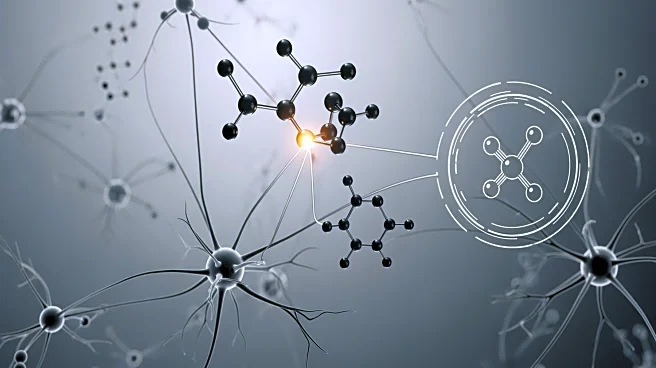What's Happening?
A recent study conducted by researchers at the Salk Institute for Biological Studies has identified a molecule, pleiotrophin, that may play a crucial role in the development and function of the nervous
system in individuals with Down syndrome. The study, conducted in lab mice, suggests that restoring pleiotrophin could improve brain function in Down syndrome and other neurological diseases. The researchers found that administering pleiotrophin improved brain function in adult mice, indicating potential advantages over previous attempts to enhance Down syndrome brain circuits. This approach could offer significant benefits by targeting astrocytes, a cell type in the brain specialized for secreting synapse-modulating molecules, to rewire brain circuitry at adult ages.
Why It's Important?
The discovery of pleiotrophin's role in brain function offers hope for new therapeutic strategies for Down syndrome and potentially other neurological disorders. Down syndrome affects approximately one in 640 babies born each year in the U.S., leading to developmental delays and increased risk for medical problems. The ability to improve brain function in adults through gene therapies or protein infusions could significantly enhance the quality of life for individuals with Down syndrome. Furthermore, the approach of using astrocytes to deliver plasticity-inducing molecules could have implications for other neurodevelopmental and neurodegenerative disorders, such as fragile X syndrome and Alzheimer's disease.
What's Next?
Further research is needed to understand the complex contributors to Down syndrome and to explore the potential of pleiotrophin as a treatment option. Researchers aim to investigate how astrocytes can be reprogrammed to deliver synaptogenic molecules, which could have beneficial impacts on various neurological conditions. The study provides proof-of-concept for targeting astrocytes to induce brain plasticity, paving the way for future developments in gene therapy and protein infusion treatments.
Beyond the Headlines
The study highlights the potential for innovative approaches in treating neurological disorders by focusing on cellular mechanisms and secreted molecules. The ability to rewire brain circuitry in adults challenges traditional views on brain plasticity and opens new avenues for research and treatment. Ethical considerations regarding gene therapy and the delivery of molecules to the brain will need to be addressed as research progresses.










